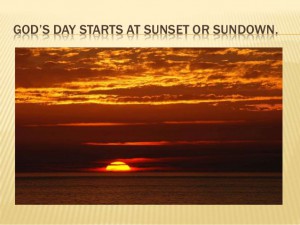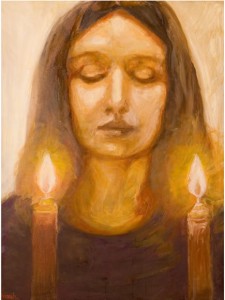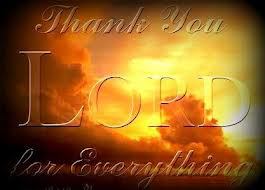KINDLE THE SABBATH LIGHTS
We meet once again at sundown, erev Shabbat,
to welcome the Queen of all days,
to seek our Lord YHWH’s blessings upon our celebration
as we enjoy one another’s company,
and acknowledge His Presence;
for YHWH is truly the invisible Guest of Honor
Who graces the special gathering
of all keepers of His Holy Sabbath.We avow that the fourth commandment in the Decalogue
is not a burden but a pleasure to obey in special observance,
a most welcome respite from the routines of our six-day workweek,
necessary for humanity’s physical, mental and spiritual wellbeing,
truly a gift of rest,
for all that have the breath of life should enjoy,
not only as an indulgence,
but as a matter of survival,
besides enhancing our quality of life.
We thank the LORD of the Sabbath, YHWH,
for commanding us to enter Your sanctuary in time,
to seek Your company
while in fellowship with our faith community,
for renewal of family ties and friendship,
and for worship of You
and the study of Your Torah.
We recall the words of Your mouthpiece,
the prophet Isaiah, as he addressed Israel:
If you refrain from trampling the sabbath,
from pursuing your affairs on My holy day;
If you call the sabbath “delight,” YHWH’s holy day “honored”;
And if you honor it and go not your ways
Nor look to your affairs, nor strike bargains—
Then you can seek the favor of YHWH.
I will set you astride the heights of the earth,
And let you enjoy the heritage of your father Jacob—
For the mouth of YHWH has spoken.
[Isaiah 58:13-14 in modern application:]
“If you watch your step on the Sabbath
and don’t use my holy day for personal advantage,
If you treat the Sabbath as a day of joy,
God’s holy day as a celebration,
If you honor it by refusing ‘business as usual,’ making money, running here and there—
Then you’ll be free to enjoy God!
Oh, I’ll make you ride high and soar above it all.
I’ll make you feast on the inheritance of your ancestor Jacob.”
Yes! God says so!
As Gentiles who worship You, the God of Israel,
and embrace Your firstborn son Israel as Your ‘light to the nations’;
we pray for peace in the Holy Land,
for peace of heart and mind,
and continued protection of the Jewish people
amidst the threats they face continually.
We pray for their survival during non-stop assaults
from hostile nations, religious radicals, antisemitics,
but most specially the angry enemy within their own borders,
with whom they need to deal with wisdom,
and if at all possible, to find mutual understanding,
and convince the ‘other’ to agree to live in peaceful co-existence
in their individual sacred space and communal shared spaces
in the city of ‘shalom’, Yireh Shalem, Yerushalayim, Jerusalem,
in the land of promise,
divinely set apart to provide Israel
rest from her strivings,
which Israel’s national history sadly has not realized
since the prophesied return of their remnant
to the Holy Land.
We pray for their unity not only in matters of ethnicity and culture,
but most of all, unity in matters of faith,
in belief and trust in You, their God,
that the secular among their population
who are spread out all over the world
will return to the last recourse which should be the first,
when all human possibilities for peace have been exhausted,
that all Israel will unite in calling on Your Name,
YHWH,
the God of their Patriarchs,
the God Who chose them to be Your covenant people
the custodians of Your Manual for Life for all humanity,
Who prepared them to become a blessing to the world,
and a light to the nations.
May they fulfill their destiny to be both blessing and light,
as doubters even among them live in unbelief,
as people of faith await the fulfillment of prophecies
regarding a “chosen” people whose very survival
and presence in this age of skepticism,
is the testimony to You as the One and Only God,
and to the truth of Your pronouncements from ancient past
as recorded in their Hebrew Scriptures.
You are the God whose Name
is etched in their individual consciousness
and collective memory,
and whose acts are recorded in their national history.
We thank You for the blessing that Israel has been to the world,
for fulfilling the role You have assigned them
as witnesses for You
despite the odds they face,
for recording the Torah
for all humanity to consider as a Way of life,
for their contributions
to the advancement of knowledge
in all fields of learning,
and contributions to the quality of life
brought about by the brilliance and genius
of their outstanding achievers.
We cling to the promises uttered by Isaiah to Israel,
for just like observant Jews,
we consider Your Holy Day, the Sabbath,
as a day of joy, a day of celebrating life,
a day to delight in, devoted to connecting with You,
O YHWH, God of Israel,
God of the Nations,
God of Sinaites,
Lord of the Sabbath.
As Gentiles,
virtual ‘outsiders looking in’,
may we share in the blessings You have promised Israel,
Gentiles who have embraced You, the God of Israel,
Gentiles who love you with all mind, heart and soul,
Gentiles who obey Your commandments,
and who live Your Torah.
Amen.
To know You,
the one True God,
and to know Your Name,
O YHWH,
is a blessing.
To know that You have prescribed a way of life
for all people on earth
and to live it day by day,
is a blessing.
To be in the company of individuals
who worship and love You
and love one another,
is a blessing.
To be born into a loving family—
parents, siblings,
spouses, children,
and grandchildren —
is a blessing.
To fellowship with one another every Sabbath
and share the joy of your provisions
symbolized by the bread we share
and the wine we drink—
is a blessing.
For all these and so much more,
for daily graces and mercies
and provisions poured
into each day
of our life on earth—
we thank You, Lord YHWH.
SABBATH MEAL
HAVDALAH
Once again we remember Your words through your mouthpiece, Isaiah:
No longer shall you need the sun for light by day,
Nor the shining of the moon for radiance [by night];
For YHWH shall be your light everlasting.
Your God shall be your glory.
Your sun shall set no more.
Your moon no more withdraw;
For YHWH shall be a light to you forever.
And your days of mourning shall be ended.
And your people, all of them righteous,
Shall possess the land for all time;
They are the shoot that I planted.
My handiwork in which I glory.
The smallest shall become a clan.
The least, a mighty nation.
I, YHWH, will speed it in due time.
May it be so for Israel!
And as for us who are not of ethnic Israel,
may our names and the names of our loved ones
be written in YHWH’s Book of Life,
as we each make the right choice
every time we are challenged to make a compromise,
a choice to align our will with Your Will
in every situation where we are tempted
to submit to the ‘I’ in I-dolatry,
instead of the ‘I’ in Your Image.
May we write our individual Book of Life
by the way we live–
moment by moment,
day by day,
year by year,
on to the end of our days.
May the words we hear from YHWH, our Life-Giver be–
“well done, Gentile, Sinaite,
[say your name]______________
who heard My Voice from Sinai,
who took My Torah seriously,
who strives to know Me and My Way,
and calls on My Name,
who responded to the challenge given to Israel
to ‘choose life’-—
May Your message to us be —
“You are among My Chosen.”
Amen.
In behalf of Sinai 6000 Core Community,
a rest-full and peaceful Sabbath to one and all!
NSB@S6K



























